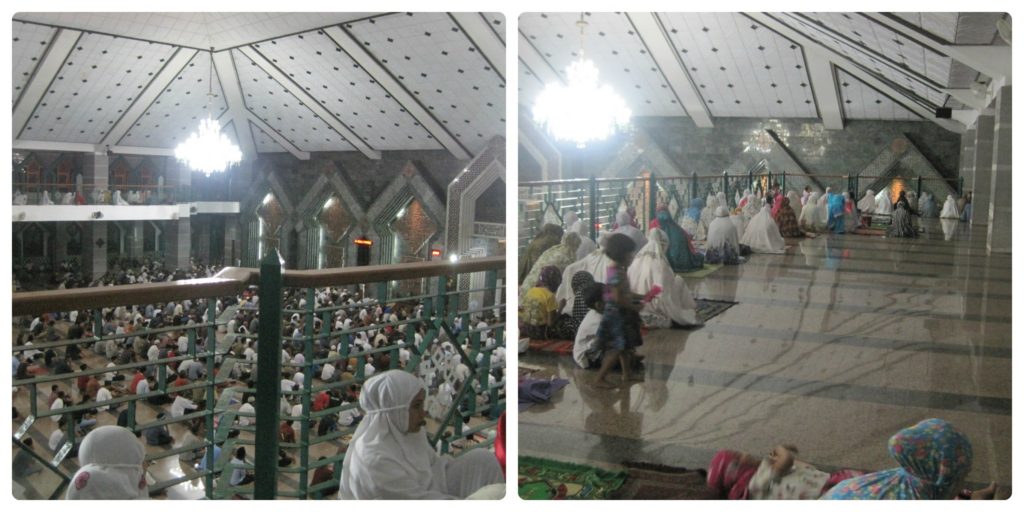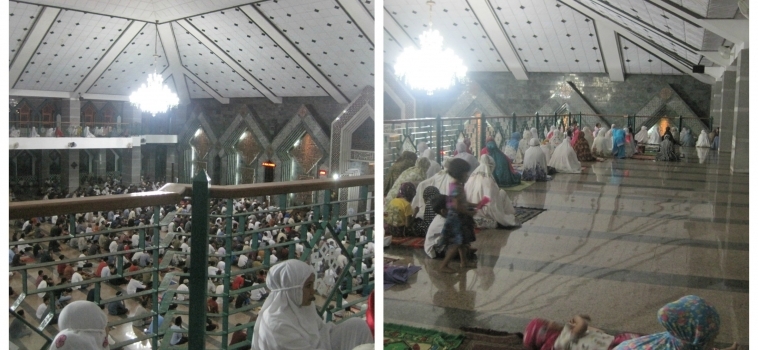What experts say
Recently I read several reasonable suggestions on how to involve children in taraweeh prayers and how to keep them well behaved, written by an Indonesian Islamic Parenting practitioner. She suggested that long before Ramadan, we should train the children to get used to the mosque and the congregational prayer by going to the less crowded congregational prayers first, such as the Duhr and the Ashr prayers. Instil in them the understanding of congregational prayers, teach them to join the congregational prayers and make it a habit for them to behave well. After that, introduce them gradually to the more crowded congregational prayers such as Maghrib and Isha, and then the Jumma prayer, and at last the taraweeh prayer. By the time they get to taraweeh prayer, they will be already familiar with the manners regarding congregational prayer, and you have to worry less about them disturbing people and embarrassing you. This strategy made a lot of sense to me and made me reflect back on my experience as a child in congregational, especially taraweeh, prayers, and what I observe in children during congregational prayers as a grown up.
My experience as a child
Since I was a child, at Kindergarten age as far as I can remember, my Dad made it a habit for our family to pray Fajr and Maghrib in congregation together at home. As small children my siblings and I were taught to join the congregation led by my Dad. So even though our prayer movements were not perfect yet, we understood from an early age what prayers were about and what the manners for congregational prayers were. Later on, when we were at our elementary school years, our extended family usually had a weekly gathering to pray congregational taraweeh together during Ramadhan. My siblings and I usually joined the congregational taraweeh prayer alongside the adults. As children, we were just told to join as far as we were able and could rest quietly when we were tired. In comparison to other children, we were calmer and tamer during taraweeh congregational prayer, because we were used to daily congregational prayer at home, plus our parents had given us proper direction and explanation. However, we were still children and would also occasionally got caught up in playing with other children, making loud noises, etc. Fortunately, there were always adults who would supervise us, and reminded us gently to be quiet and to listen to the Khutba. So gradually and naturally we learnt with other children the proper manner in such congregations.
What I observed
In my home country, little children are commonly found sitting or running around during congregational prayers in mosques and other gatherings. The parents and other people let them be because the main reason to bring the children to the mosque was to naturally attach their hearts to the mosque and familiarise them with Islamic rituals. Children are also commonly present in sermons and other informal classes. Their presence is not discouraged, and they are usually not seen as a distraction. For example, when a baby cried during a class, and the baby’s mother rushed to get the baby out of the room, the high-profile speaker told her to stay with the baby in the class instead and did not mind that the baby was crying. The talk continued, and everybody was listening attentively to the speaker who seemingly did not lose his train of thought while the baby was crying from time to time. It is also not uncommon to hear babies crying during congregational prayers such as taraweeh. Nobody protested and most people appreciate the mother’s effort to attend taraweeh prayers despite being busy with her baby child. When the children become older, they usually join the prayers in the prayer row. My nieces and nephews imitated our prayer movements since they were toddlers and they frequently request to join us in prayers without us asking them to. They frequently followed my Dad to a nearby mosque, sit in prayer line, and imitate the prayer. They then learnt proper prayer procedures later at school.
Only when I lived in the west did I realise that it is not always the same in other Muslim communities. I witnessed with shock how in Islamic gatherings, mothers were blamed and reprimanded for their loud children in public and both mother and children were repeatedly asked to leave the room. This might be usual and even the norm for some communities, but for me it took some time getting used to. On the other hand, in these communities a special room for mothers and children are usually provided whenever possible, and during taraweeh congregational prayer, child-minding services may also be provided. Well, different communities may have different preferences in introducing enjoyable experience in religious activities for children. A different arrangement for each community is fair enough as long as it results in a positive experience for the children, leaves a lasting positive impression on them, and attaches their hearts to the mosque, the community, and the Islamic tradition.
A few suggestions
To instil fondness of the Islamic tradition in children, and to provide them with positive experience especially during congregational taraweeh prayer in Ramadhan, there are several points I would like to suggest:
- Get them used to prayers, congregational prayers, and their adabs since an early age. Lead by example and pray in front of them. Make congregational prayers a regular habit either at home, family or community gatherings, or at the mosque. As the children grow, get them gradually to understand the adab of prayer, to respect people who are praying by reducing noise levels, and to always be aware that God is watching them, and grow in them the desire to love and please God.
- Carry them while you pray. For mothers or even fathers of infants and toddlers, it is allowed to carry your infant or toddler while you are praying, especially if there is nobody else to help you to take care of them and you need to soothe them. When you want to do rukoo or sujood you can put them down by your side on the floor and continue your prayer. This procedure is legit in Islam. Ask your local knowledgeable scholar how to perform it properly.
- Get them to pray in line beside you during taraweeh. When the children are old enough, get them to pray in the prayer line with you. Teach them how to perform prayer beforehand. If they have not reached puberty, allow them to pause quietly as necessary during taraweeh prayers. Prayer is not obligatory for children who have not reached puberty, so joining you in congregational prayer will just be some sort of training for them, and thus leniency should be applied. The goal is only to get them familiar with congregational prayer and grow fondness of it in their hearts, and not to overwhelm them with it. As the children get older and can pray by themselves without supervision, you can let them pray in designated children rows, usually at the very end for boys and at the very front for girls.
- Give them gentle reminders. If the children misbehave and disturb the congregation with their noise, give them a gentle reminder and make them aware of other people who are praying. Explain to them in their level of understanding that prayers are sacred and people who are praying should be respected by not creating noise. Children are human too, and they are able to think and are usually willing to listen if we explain to them properly within their level of understanding. It is easier to give them understanding in a young age rather than when they have grown older and have developed a rebellious nature.
- Realise that children are children. Children’s nature is to play, explore, and create noise along the way. Not every child can sit quietly as told. Some are more active and are in constant move than others. Do not get discouraged if they get noisy again after a while, or if they do not listen to your reminders at all. Keep reminding them gently. They may not listen today, but bit by bit it will stay in their mind. Refrain from making them feel unwelcome in Islamic gatherings. If you have volunteers, try to distract the children with activities they like according to their age. It could be colouring, listening to prophetic stories, Quran memorization competition, etc. Ask advice from people who have experience on how to keep children busy.
- Child-minding facility. If you feel it is necessary to keep the children separate from the congregation, a child-minding facility may be an option. However, it is important to find out what the legal requirements for this in your area are, and if it is required by law to have professionals responsible for the child-minding activity. Maybe there are professionals in your congregation who may volunteer to take up this responsibility. And sisters who are exempted from fasting and prayers are usually keen to volunteer to take care of the children. However, make sure that children to carer ratio is reasonable and acceptable.
So, these are some suggestions for better children experience in taraweeh congregational prayers. Do you have other experiences, observations, and suggestions that you would like to share as well?

Children during congregational taraweeh prayer in women’s section in one of the mosques in Makassar, Indonesia.
About the Author
AussiePursuit is an Indonesian Muslima currently a PhD Candidate in Biomedical Engineering at an Australian university. She has three nieces and five nephews whom she loves to watch growing. She volunteered during Ramadan at the university musalla last year where she experienced firsthand the challenges of creating a space and a positive experience for children during religious activities such as congregational prayers during Ramadan. You can find her blog here.





